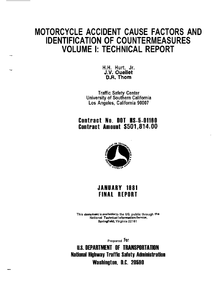
The Hurt Report, officially Motorcycle Accident Cause Factors and Identification of Countermeasures, was a motorcycle safety study conducted in the United States, initiated in 1976 and published in 1981.[1][2] The report is named after its primary author, Professor Harry Hurt.
Noted motorcycle journalist David L. Hough described the Hurt Report as "the most comprehensive motorcycle safety study of the 20th century."[3]
The study was initiated by the Department of Transportation's National Highway Traffic Safety Administration, which contracted with the University of Southern California Traffic Safety Center — the work was ultimately conducted by USC professor Harry Hurt.[3]
The Hurt Report findings significantly advanced the state of knowledge of the causes of motorcycle accidents, in particular pointing out the widespread problem of car drivers failing to see an approaching motorcycle and precipitating a crash by violating the motorcyclist's right-of-way. The study also provided data clearly showing that helmets significantly reduce deaths and brain injuries without any increased risk of accident involvement or neck injury. The full title of the report was Motorcycle Accident Cause Factors and Identification of Countermeasures, Volume 1: Technical Report.
After retiring from USC in 1998, Hurt established and headed the Head Protection Research Laboratory (HPRL), of Paramount, CA.[3]
- ^ "Riders Need to Act to Get a New Motorcycle Crash Study". Archived from the original on October 16, 2013. Retrieved January 24, 2013.
- ^ ABATE
- ^ a b c Cite error: The named reference
soundwas invoked but never defined (see the help page).
